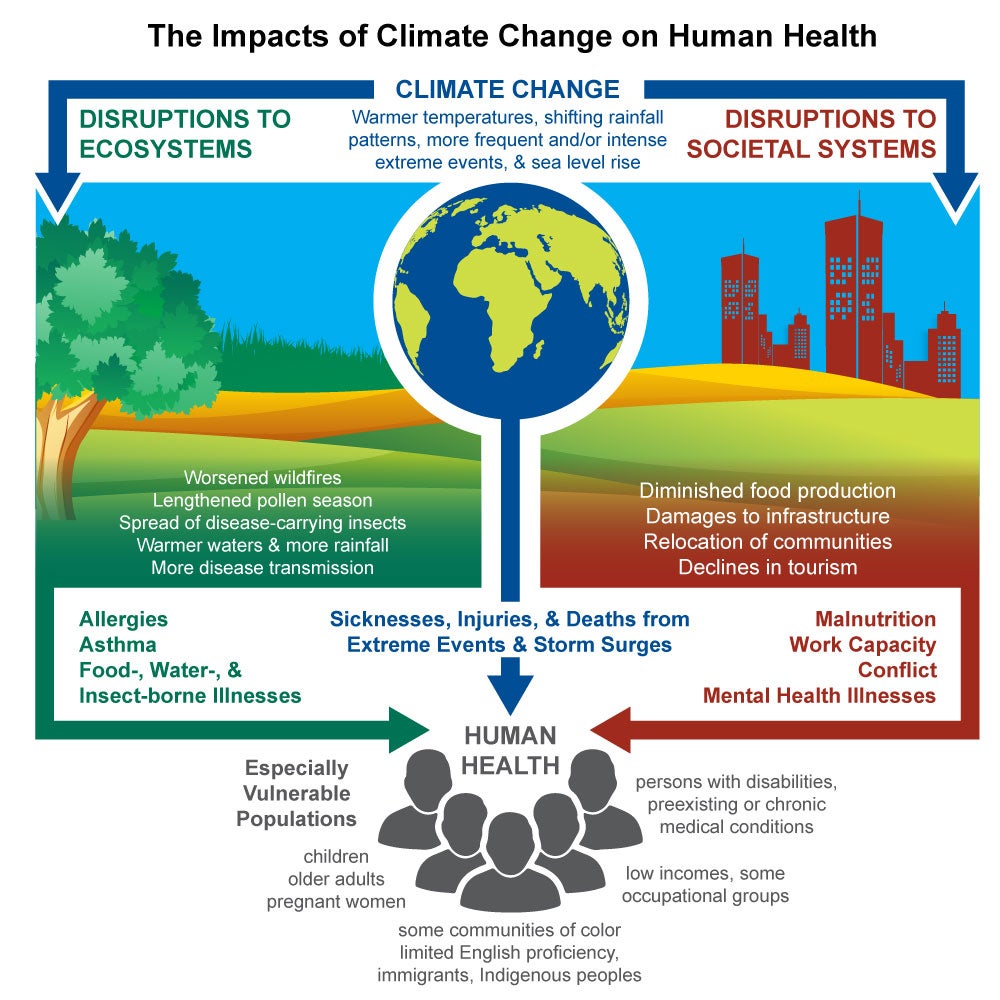We have even more information this week about the ways climate change poses a threat to human health.
The U.S. Global Change Research Program just released its newest report—The Impacts of Climate Change on Human Health in the United States. This scientific assessment is the culmination of three years of work by hundreds of experts, and builds on the more general National Climate Assessment released in 2014.
The report concludes that every American is vulnerable to the health impacts associated with climate change.
Scientists have known for decades that climate change threatens human health via excessive heat, worsened air quality, water related illnesses, food safety, diseases transmitted by pests like fleas and mosquitos, and mental stress. The new report thoroughly characterizes our current understanding of these impacts.
Because scientific understanding has advanced significantly in recent years, the authors also reviewed new information and insights from several recent scientific, peer-reviewed publications and other publicly available resources.
For example, new data revealed that the Ragweed season has grown by as much as 27 days in the central U.S. from 1995 to 2011, and the incidence of Lyme disease in the Northeast has doubled from 2001 to 2014, both consistent with warming trends.
Recent modeling studies have also improved quantification estimates of and confidence in projected health outcomes from climate change. By midcentury, scientists project that there will be as many as thousands of additional ground-level ozone (smog) related illnesses and premature deaths, and the majority of the western U.S. will have a 500 percent increase in the number of weeks with risk of very large fires. By the end of the century, scientists project that there will be an additional 27,000 summertime heat-related deaths annually in over 200 U.S. cities (that are currently home to 160 million people), and harmful toxin-producing algal blooms could develop up to two months earlier and persist for up to two months longer.
Through climate and weather changes and disruptions to ecosystems and societal systems, here are the main concerns about climate change impacts on human health:
- Temperature Related Death and Illness — Future climate warming could cause up to tens of thousands of additional deaths each year from heat in the summer, from loss of ability to control internal temperature, and worsened chronic cardiovascular and respiratory diseases
- Air Quality Impacts — The future could include limited productivity at work and school due to exacerbated ground-level ozone (smog) health impacts from modified weather patterns conducive to ozone formation, and worsened allergy and asthma conditions from more airborne pollen and longer pollen seasons
- Vectorborne Disease — The seasonality, distribution, and prevalence of vectorborne diseases, including Lyme disease and West Nile virus, may change with changing temperature and rainfall patterns due to altered geographic and seasonal distributions of mosquitoes, ticks, and fleas
- Water-Related Illness — Risk of exposure to illnesses increases as the growth, survival, spread, and toxicity of water-related pathogens and toxins is impacted by temperature and extreme rainfall events, and aging water infrastructure is vulnerable to failure with extreme events and storm surges
- Food Safety, Nutrition, and Distribution — Rising temperatures, changing weather patterns, and extreme events have consequences for contamination, spoilage, and the disruption of food distribution, whereas higher carbon dioxide levels lower nutritional value of crops despite boosting plant growth
- Extreme Weather — Fatalities, injuries, and infrastructure damages are imminent with increases in the frequency and/or intensity of extreme precipitation, hurricanes, coastal inundation, drought, and wildfires
- Mental Health and Well-Being — Mental health conditions may develop with exposure to disasters or worsen by extreme health
Overall, the report is a sobering portrait of the risks we face because of climate change — and it underscores the urgency for climate action.










